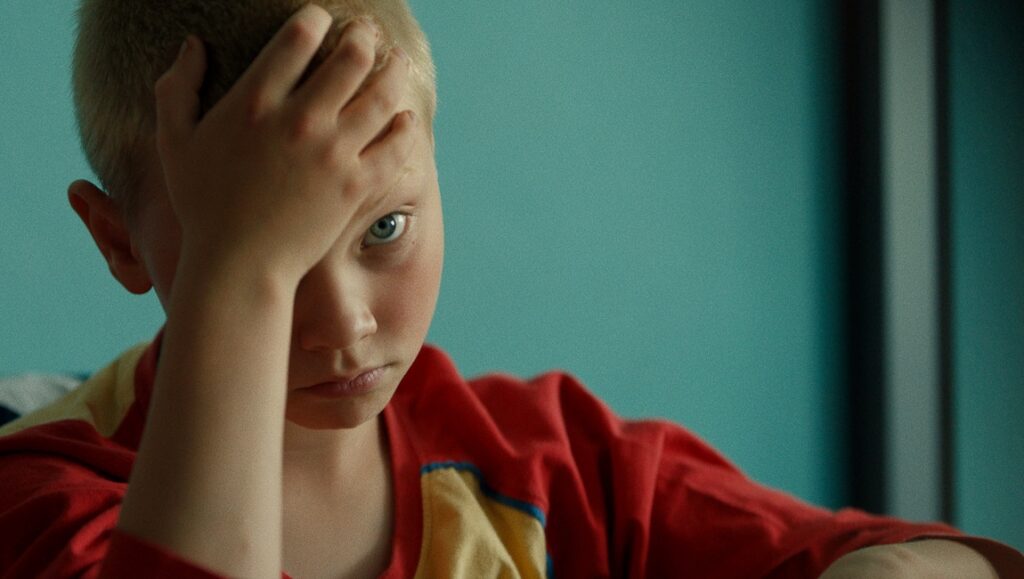The Worst Ones, the debut film from Lise Akoka and Romane Gueret, opens on interviews with the young French people Flemish film director Gabriel (Johan Heldenbergh) has chosen to cast in his new film. That film, which we’re later told is called Pissing in the North Wind, is a story about a pregnant teen and her younger brother living in poverty. And to cast the film, Gabriel is seeking non-professional actors, specifically youth from the Picasso project in Boulogne-Sur-Mer. In one of the interviews — they’re presented intercut with each other — the subject says that people in the neighborhood say that the film is only taking “the worst ones,” that the film will not be representative of the positive aspects of their environment because it will show a stereotypical view populated with kids they see as hoodlums and bad seeds.
Food for thought, maybe, as films dealing with poverty — especially those starring nonprofessionals — are often accused of being misery porn. Certainly Gabriel is guilty of some degree of exploitation. The story he’s telling is, at times, uncomfortably close to the real lives of his child actors, asking them to channel their pain and grief into his art. In one scene of Gabriel’s film, toward the end, the pregnant girl cries with her brother because, due to an unseen prank he pulled, she believed him dead. The actress, Lily (Mallory Wanecque), is still grieving the recent loss of her baby brother to cancer and watching her perform a version of that grief for this man’s probably mediocre movie is sickening. Likewise, Ryan (Timeo Mahaut), who plays the little brother, lives with his sister because his mother has been deemed unfit, and is given to fighting with other boys at school. Gabriel uses this, too, and, in a schoolyard fight scene, he encourages the boys to use their own words to hurt each other until the scene erupts in actual violence. But while Gabriel’s set often verges on exploitation, Akoka and Gueret don’t seem interested in simple indictment of the process, their background working in casting for projects like this allowing for a bit more nuance than easy finger-wagging.
But the neighbors who refer to the film’s cast as “the worst ones” are less concerned with the exploitation of the actors than with that of their own image. They are more concerned with attracting more wealthy residents to the neighborhood than they are the wellbeing of kids like Lily or Ryan who they actively spurn. If anything, the set, for all its questionable ethical practices, provides something of an escape from reality and a new, fulfilling experience for Lily and Ryan. This is especially true when the scope of the set expands outward from the director to include the crew who are more friendly and down to earth with the kids, providing them with more helpful guidance and encouragement. The Worst Ones finds its groove by rejecting both the neighbors’ scorn for these kids and Gabriel’s artistic pity, showing Lily and Ryan in a more varied, lifelike light, unbound by the expectations placed on them by others or a camera. And Wanecque and Mahaut are terrific playing what amounts to a dual role each; they’re easily the best thing about the film.
But as Akoka and Gueret focus on their leads, a few of the other kids disappear into the background, given only flashes of real personality before being dropped entirely. Jessy (Loic Pech) gets the short end of the stick, for as much as Pech works to imbue the character with vulnerability, he comes off as a sexist, homophobic bully, happy to slink back into his group of friends and yell “slut” at Lily. He becomes part of the community that is portrayed as simplistically mean to the stars. The Worst Ones is sensitive, intelligent filmmaking, but its even-handed nature toward both the population of Picasso and Gabriel’s film sometimes feels like an elision of perspective, like it’s walking up to the line but ultimately letting everyone off the hook. The film can subsequently sometimes feel aimless or slight, though there’s no denying that strong performances keep it buoyed as an affecting drama.
Published as part of Cannes Film Festival 2022 — Dispatch 2.


Comments are closed.